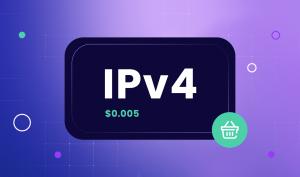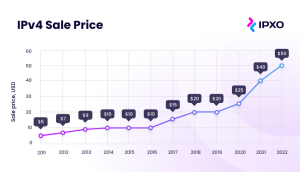New Standard for Responsible IP Pricing and Management
— Vincentas Grinius, CEO of IPXO
LONDON, UK, September 14, 2023/EINPresswire.com/ — In our increasingly digital world, IP addresses have become one of the most valuable resources for businesses worldwide. As a core building block of cloud infrastructure and online platforms, these numerical identifiers that underpin connectivity are now being treated as strategic assets.
This pivotal shift is being catalyzed by a major pricing announcement by Amazon Web Services (AWS) in July 2023. In a landscape-reshaping move, AWS declared that starting February 2024, it will charge customers $0.005 per public IPv4 address per hour – amounting to around $43 per IP address annually.
This seismic change by the cloud titan holds monumental implications not just for AWS clients but the IP address market at large. Industry experts highlight how it establishes a benchmark for responsible IP pricing, promotes much-needed transparency in costing models, and may potentially accelerate IPv6 adoption.
THE BACKDROP: AWS DOMINATES THE IP ACQUISITION MARKET
To grasp the magnitude of AWS’s decision, we must first acknowledge Amazon’s gargantuan role as the leading buyer of IP addresses. According to IPXO research, Amazon, Microsoft, and Google accounted for over 50% of the 377 million IP address transfers between 2009 and 2022.
AWS has been especially active, acquiring over 126 million IP addresses since 2011 from the likes of DuPont, MIT, HP, Ford, AT&T, and more. In 2022 alone, AWS secured a mammoth 23.2 million IP addresses – more than doubling Microsoft’s acquisitions and exceeding Google’s by over eight times for that period.
This data spotlights how AWS, with its unparalleled scale and resources, dominates the IP address acquisition arena. By stipulating that its owned IP addresses warrant a lease rate of around $43 per year, AWS has set a new standard for the broader industry.
WIDER RAMIFICATIONS OF AWS’s PRICING STRATEGY
AWS’s revised IP pricing aligns logically with its business model of charging for various resources like requests, usage, traffic, and IPs. However, the ripple effects span beyond AWS’s own operations.
On one hand, this could significantly impact AWS clients like telcos, ISPs, and SaaS businesses that lease large IP batches to support extensive cloud workloads. With multi-million-dollar price hikes for leasing IPs in bulk, many may consider moving to alternative sources.
The $43 per IP rate also closely reflects the ~$50 price that a /16 block (65,536 IPs) commands on IPv4.Global, a major IP trading platform. This further validates AWS’s pricing against broader market valuations.
Moreover, AWS’s transparent pricing may influence open IP lease rates industry-wide. Take IPXO, for instance – leasing a /19 block (8,192 IPs) from the IP address management platform costs just $4,000 annually, nearly nine times less than AWS’s $352,256!
As Vincentas Grinius, CEO of IPXO, explains, “AWS’s benchmark makes IP pricing much clearer. For big enterprises needing large batches, leasing via open markets like IPXO is far more affordable.”
THE POTENTIAL PUSH TOWARD IPv6 ADOPTION
With IPv4 address scarcity escalating, could AWS’s move serve as a catalyst for enterprises to migrate to IPv6?
While we may see a slight uptick, experts believe systemic challenges will inhibit widespread IPv6 adoption for now. As Grinius notes, “The industry lacks IPv6 proficiency and tools. For most companies, it’s not an urgent priority.”
Nevertheless, AWS’s pricing shakeup may encourage niche scenarios like telecoms and suffering CGNAT issues to experiment with IPv6. It also presents an opportunity for AWS itself to promote IPv6 education and management.
If you want to delve deeper into this subject and explore the potential impact of AWS’s pricing changes on IPv6 adoption, read our detailed opinion piece.
THE RISE OF ALTERNATIVE IP MANAGEMENT PROVIDERS
Rather than IPv6 migration, a more likely outcome is the emergence of alternative IP management providers. With AWS setting the pricing bar, competitors will aim to undercut and lure clients.
We already see this with disruptors like Wasabi Technologies, which offers AWS-compatible storage at 80% less. Similar “AWS alternatives” may soon offer affordable Bring Your Own IP (BYOIP) and other IP management options.
“AWS’s costs are driving businesses to niche platforms promising savings. We’ll likely see more providers specializing in low-cost IP management,” Grinius predicts.
THE COMMODIFICATION OF IP ADDRESSES
Ultimately, AWS’s landmark move carries deeper symbolism, cementing the commodification of IP addresses as asset classes rather than just technical resources.
“AWS’s multi-billion investment in IP space signals these resources have financial value. By openly declaring pricing, they’ve established a recoupment benchmark for the industry,” analyses Grinius.
Effectively, AWS has set a precedent: IP addresses are strategic business assets warranting investment, and quality IP management is imperative for companies worldwide.
“We’re entering an era where enterprises view IP resources through a business prism. Efficient IP management is now a revenue strategy,” says Grinius.
In summary, AWS’s transformative pricing announcement has conclusively proven that IP addresses are no longer just networking tools. They now represent critical cost centers and valuable digital assets. This paradigm shift will shape IP pricing, acquisition, and management across the industry for years to come.
ABOUT IPXO:
IPXO is a leading IP address management platform, providing services to ISPs, telcos, hosting providers, and others. The company is at the forefront of addressing industry challenges such as IPv4 shortage, IPv6 adoption, management obstacles, IP defragmentation, and routing automation. With potential access to a vast number of 3.2M IPv4 addresses and a strong presence within the RIR community, IPXO is emerging as the business-critical infrastructure platform for enterprises worldwide. For more information, visit ipxo.com.
Agne Srebaliute
IPXO LLC
email us here
Visit us on social media:
Twitter
LinkedIn
YouTube
![]()






















